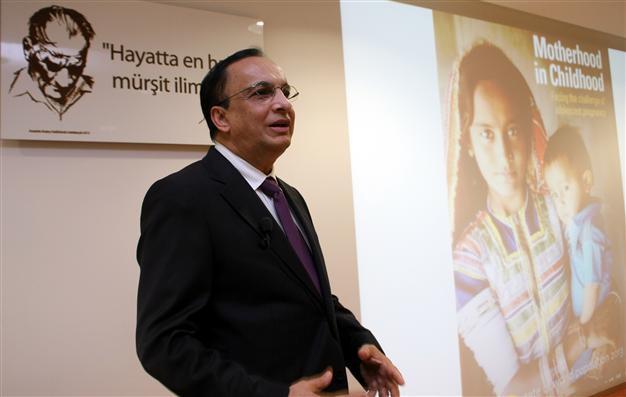Up to 91,000 girls under the age of 18 give birth every year in Turkey: UN
ESKİŞEHİR - Doğan News Agency

The UN Population Fund’s (UNFPA) Turkey representative Zahidul Huque speaks during a panel discussion at Anadolu University in Eskişehir on Oct. 30. Keeping teenagers in school is important to reduce pregnancies in girls under the age of 18, Huque said. AA photo
Up to 91,000 girls under the age of 18 give birth every year in Turkey, despite a notable decrease over the last 10 years, the U.N. Population Fund’s (UNFPA) Turkey representative Zahidul Huque has said.“The ratio of teenage births is 29 per 1,000 [women]. The ratio in Western Europe is around four per 1,000,” Huque said today during a panel discussion at Anadolu University in Eskişehir, where he commented on the U.N.’s latest report about teenage mothers.
Teenage pregnancies are more common in Turkey’s relatively poorer rural eastern provinces, though it is decreasing in the Black Sea region, according to Huque.
"The cities with the highest ratio are Ağrı, Kars, Muş, Kilis, Van, Siirt, Bitlis, Niğde, Iğdır and Şanlıurfa. However, the ratio is decreasing in Trabzon, Rize, Tunceli, Artvin, Ordu, Bolu, Eskişehir, Karabük, Gümüşhane, Yalova and Giresun,” he said.
Around 7.3 million teenage girls give birth each year in developing countries, 2 million of them aged 14 and under, according to the UNFPA report released Oct. 29, which urged governments to show more attention to this “huge global problem.”
The highest proportion of child mothers are in Niger (51 percent), followed by Chad (48 percent), Mali (46 percent), Guinea (42 percent) and Mozambique (40 percent), according to the report.
Gender equality a must
Huque also said that the rate was closely related to the number of child brides. “One of the most important methods is to raise awareness on gender equality and ensuring it. It is also important to maintain open access to information on sexual and reproductive health,” he said, adding that adults were the ones to be blamed for teenage pregnancies.
“We should stop accusing teenagers and young people over [pregnancies]. It's the adults who don’t provide the necessary information, health services and counseling to these teenagers and young people who should blame themselves,” Huque said.
Keeping teenagers in school, especially young girls, is also important to reduce these numbers, Huque emphasized.
The UNFPA’s report also pointed to class inequality on this phenomenon. Across all countries, girls who are poor, badly educated and living in remote areas are more likely to become pregnant, it stated.
















